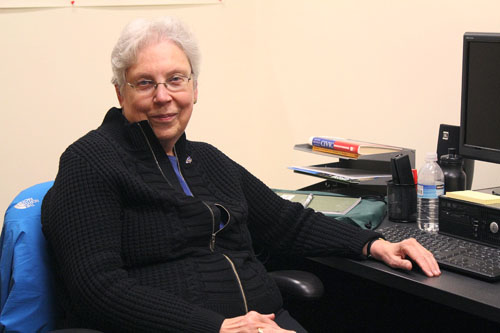Dr. Judith Ramaley, a professor of public service at Portland State, is teaching a class this term called “Ethical Leadership.” Ramaley said she spent the first few weeks of this term laying the groundwork for what she calls an “ethical toolkit.”
Class Profile: ‘Ethical Leadership’

Dr. Judith Ramaley, a professor of public service at Portland State, is teaching a class this term called “Ethical Leadership.”
Ramaley said she spent the first few weeks of this term laying the groundwork for what she calls an “ethical toolkit.”
The background gives the students ways to look at problems with an ethical perspective in mind, Ramaley said.
“I would do [the same] whether I was talking about ethical leadership in general or a particular field. For example, a biomedical ethics toolkit would be very similar because you approach ethical problems in the same way.”
She explained that to solve ethical problems it’s important to rely on experiences from all aspects of life. If those experiences do not help resolve the issue, you may have to start working theoretically from scratch, which the class discusses how to do.
Part of the class involves talking about morals versus ethics.
“Morals tend to be more internal, while ethics tend to be more about the choices you make, big actions you take, [the] way you behave and what’s visible to other people as well as to yourself,” Ramaley said.
After learning this ethical toolkit, the students start looking at papers and studies that illustrate the concept of ethical leadership. The class has a very strong focus on making sure students will be able to apply what they learn to whatever they do in their lives.
The class talks about the way that ethical people serve as role models to the people they interact with, and how to watch those people in leadership roles. The class then discusses using what you learn from those observations to think about yourself as an ethical person and what it would mean to act in an ethical way in your world.
“I try through the whole course to have this not just be floating above us in clouds, but try to attach it to choices we have to make in real situations we find ourselves in,” Ramaley said.
Finally, the class moves into a discussion of ethical behavior in an organizational environment that continues until the end of the course. “What happens when different ethical principles clash and you have to figure out how to resolve the different directions they would pull you [toward]?” Ramaley asked.
The class explores different behaviors that people consider to be ethical and unethical in the corporate world. They look at ethics when working with people who have different expectations because they have different cultural experiences to draw from or speak a different language.
They investigate the question, “How do you behave ethically across the boundaries of those differences, either in this country or if you’re working abroad?” Ramaley said.
At the end of the term, students are asked to pull from the information they have learned and explore ethical aspects of their own experiences. Ramaley said that a majority of students in the course are older than the traditional student, and they are able to draw from life’s experiences and bring invaluable insights to discussions.
Unlike Ramaley’s typical classes, “Ethical Leadership” is a fully online course. Each week she provides two or three readings, each with brief introductions that offer insights about why they have been selected. Students are required to finish a reflection assignment for each set of readings, which vary between answering questions about what was in the article to explaining how it could relate to previous class discussions or personal experiences.
“From what I can tell, all of these students live, work and study somewhere in the Portland metropolitan area,” Ramaley said. “So we can use the Portland region as a kind of working laboratory for thinking about ethics.”
In addition to the weekly readings and reflection assignments, students are encouraged to read others’ reflections, and are required to comment on at least two of them in order to help further and enrich the discussion.
“I’ve been very impressed by the quality of what students are writing and also how thoughtfully they react to each other’s posts,” Ramaley said. “When I compare this term to some of my experiences in the past with hybrid courses, I’m surprised with how rich and interesting the exchanges are.”





